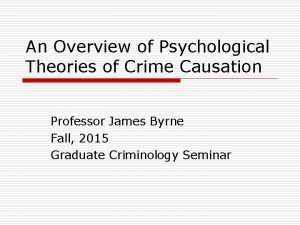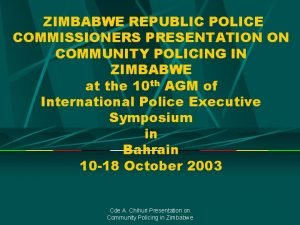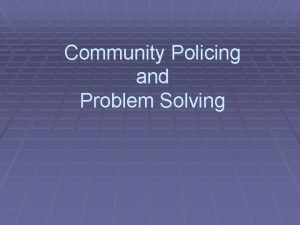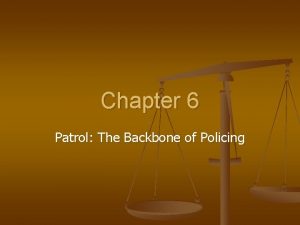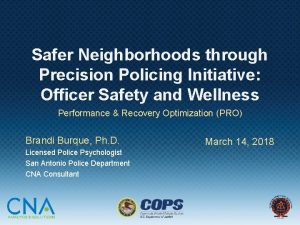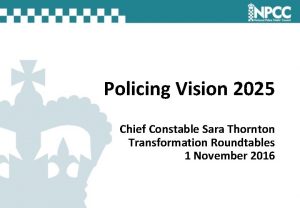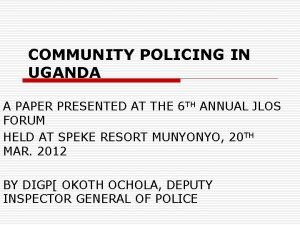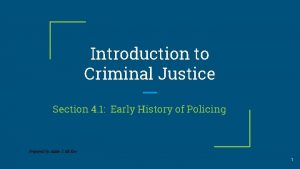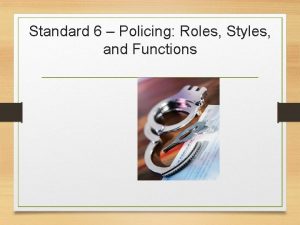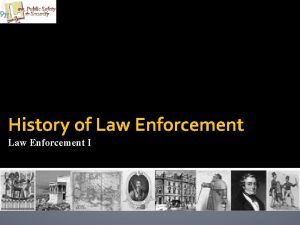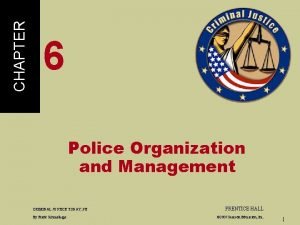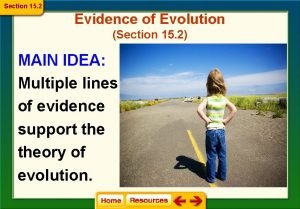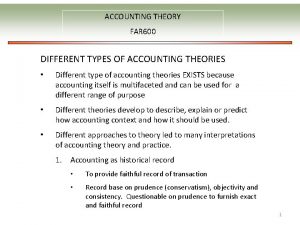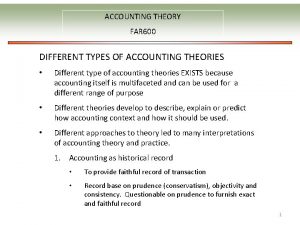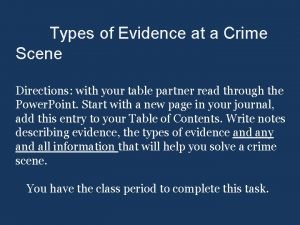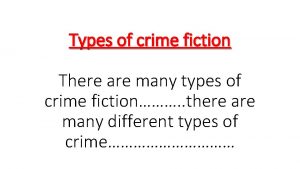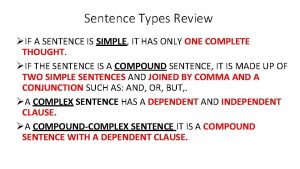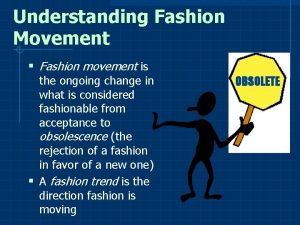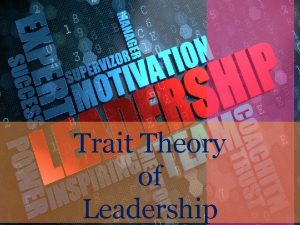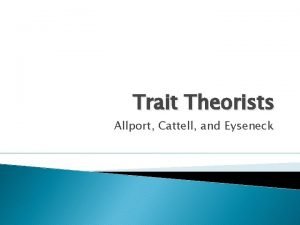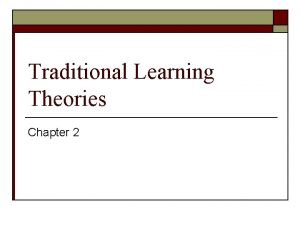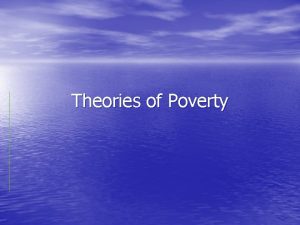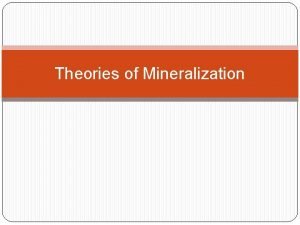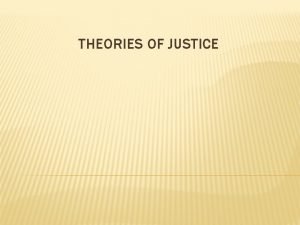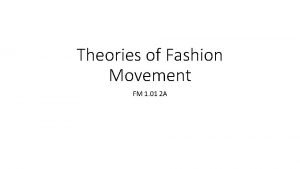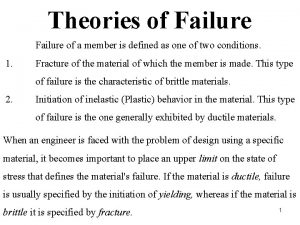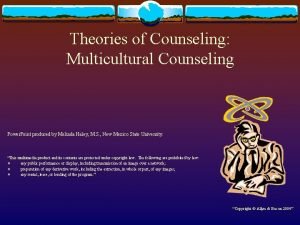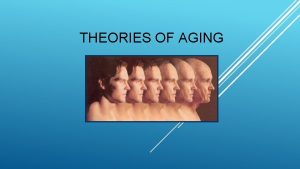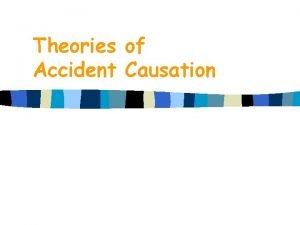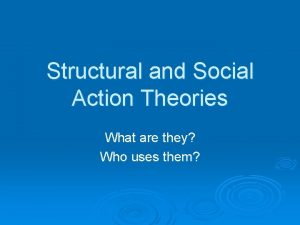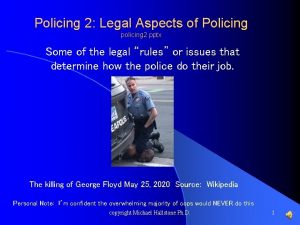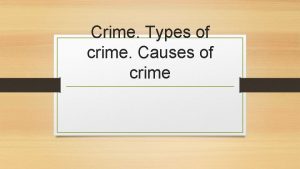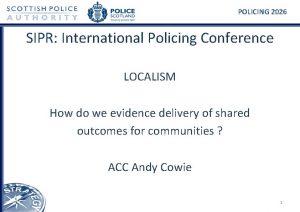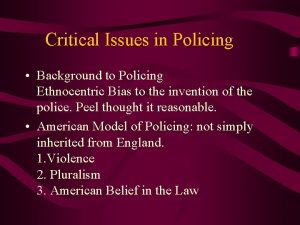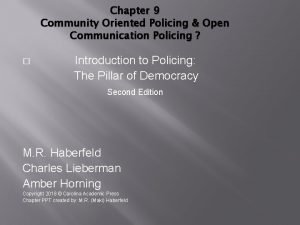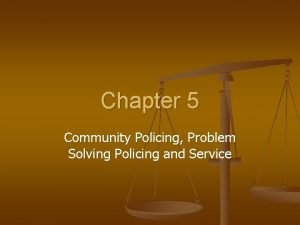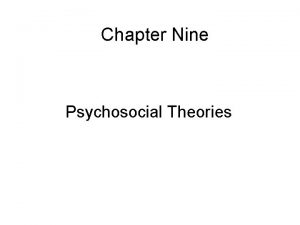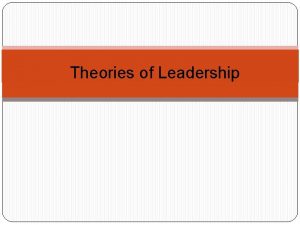Review Types of Crime Theories of Crime Policing




























































- Slides: 60

Review Types of Crime Theories of Crime Policing / Police and the Constition Introduction to the Criminal Courts

Chapter 8 Courts and the Quest for Justice

Functions of the Courts l Competing Functions of the Courts n Due Process (true adversarial process, individual rights) n Crime Control (efficiency, punishment and retribution) n Rehabilitation (based on the “medical model” of criminal justice) n Bureaucratic (courts must balance the ideal of justice and the reality of limitations)

Intro to Court Systems https: //www. youtube. com/watch? v =_dnp_01 e 4 Qw

The Basic Principles of the American Judicial System Jurisdiction “The authority of a court to hear and decide cases within an area of the law or a geographical territory” 2 types Geographical Subject Matter If crime occurs here? . . It is Tried here! Domestic Jurisdiction (Multi-State) • Murderer kills in five states…who tries him first? International Jurisdiction • Some countries will not extradite offenders back to the U. S. if facing death penalty Circuit Trial Court (upper court) • Felonies • Civil Suits of > 5 K District Court (Lower Court) • Misdemeanors • Traffic • Civil Suits < 5 K

The Basic Principles of the American Judicial System Trial and Appellate Courts n n Trial Courts having original jurisdiction l Trial courts are primarily concerned with questions of fact Appellate Courts l Act as reviewing courts l Do not use juries or witnesses to reach its decision l Do not determine the defendant’s guilt or innocence l Are concerned with questions of law

The Basic Principles of the American Judicial System The Dual Court System l Both federal and state courts have limited jurisdiction l State Court Systems n State courts try cases that are against the laws of that particular state n Considerable variation exists in state system, but much similarity is also be found. l Federal Court System n l Federal courts try cases that are against the laws of the United States. A number of crimes (e. g. , transporting of narcotics) are deemed illegal by both federal and state statutes, and persons accused of such crimes can be tried in either court system (federal and state prosecutors decide where)

Federal Courts https: //www. youtube. com/watch? v =i. M 67 z. OCT 5 q. Q

The Basic Principles of the American Judicial System America Dual Court System

Dual Court System Supreme Court of the U. S. Court of Appeals. U. S. District Courts Name: Highest State Court of Appeals State Trial Courts of General Jurisdiction Local Trial Courts of Limited Jurisdiction

The authority of a court to hear and decide cases within an area of the law or a geographical territory: _______ jurisdiction The court that reviews cases on appeal is appellate court called____

Practical Exercise You are to build the Court system structure using the signs provide to you by the instructor

State Court Systems l Typically, a state court system includes several levels of courts, including: n Lower courts, or courts of limited jurisdiction n Trial courts of general jurisdiction n Appellate courts, and n The state’s highest court

State Court Systems: Figure 8. 2 A Typical State Court System

State Court Systems- Kentucky Judicial Branch Organizational Structure Supreme Court Office of Circuit Court Clerk Administrative Office of the Courts Court of Appeals Circuit / Family Court District Court

Practical Exercise Work in small groups and draw your vision of the layout of a courtroom. Be sure to identify items in your drawing

Typical State Courtroom Layout Witness Bailiff Court Clerk Defense Table (Lawyers and defendant) Judge Stenographer (Reporter) Jury box Prosecutor Table


By U. S. law, federal judges earn the same annual salary as members of Congress: $165, 200 a year. Federal appeals court judges earn an annual salary of $175, 100. The Supreme Court judge salary for associate justices is $203, 000 Average Judge Yearly Salary in Kentucky. Judges earn a median salary of $133, 750 per year. Salaries typically start from $104, 410 and go up to $159, 290.

District and Circuit Court Processes l Traffic, Misdemeanors, violations, probable cause hearings of felonies, probating wills, Minor civil District Court cases l Major civil cases, capital offenses, felonies, divorces, appeals from District Court l Circuit Court Child support, divorces, adoptions, spousal support and equitable distribution, neglect and abuse, truancy and runaways Family Court

District Court l Court of Limited Jurisdiction which typically handles the following type of cases: * Juvenile Matters * Arraignments * City and County Ordinances * Felony PC Hearings * Misdemeanors / Traffic Offenses * Violations and Traffic Offenses * Probation of Wills * Civil Cases (5 K or less) - Appeals from District Court are made to Circuit Court * Mental Commitments



Circuit Court l Court of General Jurisdiction which typically handles the following type of cases: * Civil Matters > 5 K * Capital Offenses and felonies * Divorces * Contested Adoptions * Termination of Parental Rights * Real Estate / Probate Disputes Appeals of District Cases



Family Court l A division of circuit court hearing only matters involving families and children including: * Dissolution of Marriage * Adoption * Child Support and visitation * Paternity * Spousal Support / Equitable distribution * Neglect and abuse * Runaways and Truancy * Domestic Violence * Dependency

Kentucky Court of Appeals l This is the lower Appellate Court: Ø Cases appealed from Circuit court go through appellate court Ø Case is not retried but rather reviewed Ø Appeals Court does not sit permanently in one location Ø Occasionally published rulings on cases

Review District Circuit Divorces Probating Wills Traffic Offenses Child Support Misdemeanors Felonies Suits over 5000 Suits under 5000 Adoption Paternity test Murder Trial DUI trial Appeals from District Court Family District Circuit District Family Circuit District Circuit Family

Supreme Court of Kentucky l The State Court of last resort and final interpreter of Kentucky law: Ø Appeals involving the death penalty Ø Life imprisonment or 20 years or more Ø All other cases must be first heard by Court of Appeals Ø May publish a ruling or opinion to be published for all similar cases to follow (case law) Appeals

Kentucky Supreme Court


Quiz


Federal Courts

The Federal Court System: Figure 8. 3 Geographical Boundaries of the Federal Circuit Courts of Appeals 13 Courts

The Federal Court System l The federal court system is basically a three-tiered model consisting of: n U. S. District Courts, or federal trial courts n U. S. Court of Appeals, which hear appeals from the district courts located within their respective judicial circuits n United States Supreme Court Federal Court does not consist of Military Courts

Military Courtroom Scene https: //www. youtube. com/watch? v =_fr. M 44 b. BMf. A

The Federal Court System l The U. S. Supreme Court – The highest court in the U. S. n There is no absolute right to appeal to the Supreme Court; it reviews fewer than 0. 5 percent of cases decided in the U. S. each year n n The Supreme Court makes criminal justice policy in two ways: l Through judicial review l Through it’s authority to interpret the law The Court consists of nine justices – a chief justice and eight associate justices n Like all appellate courts, the Supreme Court normally does not hear any evidence

Kagan Ginsburg Alito Sotomayor Gorsuch Kavanaugh Roberts Thomas Breyer

Opinions from Supreme Court http: //courts. ky. gov/courts/supreme /Pages/Case. Summary. aspx? View= {990 C 9179 -05 F 2 -4189 -B 4 D 47 AF 21 A 5729 B 5}&Filter. Field 1=Ye ar&Filter. Value 1=2014

Teach the Teacher Three-Tier model of Federal Courts Appellate Courts Dissenting opinions Judicial review US Supreme Court Justices Concurring opinions Trial Courts The Judge

Judges- Roles and Duties

Role of the Judge-1 https: //www. youtube. com/watch? v =TUv. G 2 Cz. Xfc 0

Role of the Judge-2 https: //www. youtube. com/watch? v =z. Xca. WKUuwcs

Role of the Judge -3 https: //www. youtube. com/watch? v =b 90 GQUm. Oh. NY

Role of the Judge - 4 https: //www. youtube. com/watch? v =l 8 EMCi. Dq. C 1 o

Judges in the Court System Judges perform many roles in criminal case processing l In general, judges act as: n Referees (e. g. , by keeping courtroom behavior within the legal bounds) n Teachers (by explaining points of law to the jury) n Administrators (e. g. , through being responsible for the day-to-day functioning of their court) l Specific duties include: n Overseeing conduct in the court n Settling questions of evidence and procedure n Guiding questioning of witnesses n Deciding case when a jury is not used (bench trial) n Deciding sentences (in some instances)

What is role of a judge? https: //www. youtube. com/watch? v =vf. Xl--bv 7 g 4

Judges in the Court System: Figure 8. 4 The Role of the Judge in the Criminal Trial Process

Judges in the Court System Selection of Judges l In the federal system, all judges are appointed by the president and confirmed by the Senate l States vary in the processes used to select state judges: n Appointment (some states the governor nominates judges for the approval of the state legislature) n Election (states rely primarily on partisan elections; thirteen conduct mostly nonpartisan elections) n Merit Selection (involves the nomination of suitable candidates, appointment of judges, and a retention election after one year on the job



Judges in the Court System: Methods of Judicial Selection In the Fifty States

Judges in the Court System l Diversity on the Bench l A criticism of some judicial selection systems is that mostly white, upper class attorneys, nominate mostly white, upper-class attorneys n In California, where minorities constitute 54 percent of the population, only seventeen percent of state court judges are either African American, Hispanic, or Asian American n l Of the 113 justices who have served the U. S. Supreme Court in history, only: l 4 have been women l 2 have been African Americans Some argues that this is because of low minority enrollments in law schools, other contend that stereotypes limited minority selection.

Judges in the Court System Judicial Misconduct l “A general term describing behavior that diminishes public confidence in the judiciary. This behavior includes obviously illegal acts, such as bribery, and conduct that gives the appearance of impropriety, such as consorting with known felons” l States have judicial conduct commissions that investigates charges of misconduct and may recommend removal if warranted l The final decision to discipline a judge normally comes from the state’s highest court l On average, about 10 judges are removed from the bench annually. Only 13 federal judges have been impeached and convicted in the nation’s history

The Courtroom Work Group l Members of the Courtroom Work Group include: n Judges n Prosecutors n Defense attorneys n Bailiffs n Clerks of Court n Court Reporters

Courtroom for kids https: //www. youtube. com/watch? v =_MCArc. Er 5 Hk

Courtroom Working Group Duties- Page 264

Courtroom Working Group Judge Defense Attorney Duties. To make sure that proper legal procedure is followed before, during, and after the trial Duties- Prosecutor Duties- To advocate for the client’s innocence To convict those guilty of crimes against society Copy this on handout
 Sociological perspective of crime
Sociological perspective of crime Modern biological theories of crime
Modern biological theories of crime Crime and the life course
Crime and the life course Psychological theories crime causation
Psychological theories crime causation Community policing in zimbabwe
Community policing in zimbabwe 9 policing principles code of ethics
9 policing principles code of ethics Digital policing portfolio
Digital policing portfolio Introduction of community policing
Introduction of community policing Community policing
Community policing Backbone of policing
Backbone of policing Traditional policing meaning
Traditional policing meaning Precision policing
Precision policing Police vision 2025
Police vision 2025 Community policing in uganda
Community policing in uganda Community governance definition
Community governance definition Chapter 5 policing history and structure
Chapter 5 policing history and structure Kin policing
Kin policing Backbone of police organization
Backbone of police organization Policing styles
Policing styles Scottish institute for policing research
Scottish institute for policing research Pharaoh hur moheb
Pharaoh hur moheb The watchman style of policing emphasizes
The watchman style of policing emphasizes Section 15-2 evidence of evolution answer key
Section 15-2 evidence of evolution answer key Types of accounting theory
Types of accounting theory Accounting theory
Accounting theory Chapter review motion part a vocabulary review answer key
Chapter review motion part a vocabulary review answer key Ap gov review final exam review
Ap gov review final exam review Nader amin-salehi
Nader amin-salehi Example of inclusion and exclusion criteria
Example of inclusion and exclusion criteria Narrative review vs systematic review
Narrative review vs systematic review Types of crime scene
Types of crime scene Types of crime fiction
Types of crime fiction Types of crime
Types of crime Theoretical framework and literature review
Theoretical framework and literature review Sentence types review
Sentence types review Type of theories
Type of theories Theories and values of positive practice
Theories and values of positive practice Sector model theory
Sector model theory Pass the proton acid-base theories answer key
Pass the proton acid-base theories answer key Fashion laggers
Fashion laggers Trait theories
Trait theories Phil allport
Phil allport Traditional learning theories
Traditional learning theories 10 theories used in public relations
10 theories used in public relations Oscar lewis theory
Oscar lewis theory Graphic organizer activity 14 theories of personality
Graphic organizer activity 14 theories of personality Carl jung personality
Carl jung personality Collagen seeding theory
Collagen seeding theory Theories of justice
Theories of justice Theories of human rights
Theories of human rights Trickle down fashion theory examples
Trickle down fashion theory examples Distortion energy theory problems
Distortion energy theory problems Multicultural counseling theories
Multicultural counseling theories Theories of child psychology
Theories of child psychology Subculture theory of aging
Subculture theory of aging Theories of accidents osha
Theories of accidents osha The humanistic approach to personality
The humanistic approach to personality A systematic statement of principles and generalizations
A systematic statement of principles and generalizations Nursing theories related to teenage pregnancy
Nursing theories related to teenage pregnancy Social functionalism examples
Social functionalism examples Sociological theories
Sociological theories



